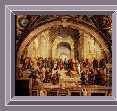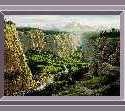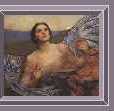Through the Looking Glass

There's a small but highly interesting genre of Fantastic Fiction known as Alternate History, wherein some actual historical event is altered (i.e., Napoleon won at Waterloo, or Hannibal stayed on his side of the Alps), and the consequences of such an historical altering are explored and extrapolated.
There are two subgenres that I can discern under Alternate History: Steampunk and Alternate Reality, each of which overlaps with Science Fiction and Fantasy respectively.
In brief: Steampunk includes the convention that somehow - often through the slightly more fantastic than scientifically possible medium of time travel - incredible scientific developments are introduced into history at a much earlier date - such as heavy atillerary in Alexander the Great's hands, or surveillance technology in the Mayan Empire.
Alternate Reality generally includes some form of magic possible in our historical past.
The latter is very close to but should not be confused with Urban Fantasy, in which the impossible (magic) is possible in modern society (often the grunge world), nor with Tolkeinesque sub-created worlds which are similar to our own but are distinctly another world altogether (see In a World of Their Own for this as yet unnamed form of excellent literature).
Alternate Reality always takes place in our world with our history but with a significant change in What Is Possible. Really, the best way I can think to describe it is Alice going through her looking-glass.
For a quick guide to this, please also take a look at the Glossary, and the Hierarchy of the Arts Chart (the third and fourth ones particularly).
Patricia Wrede
A multitalented authoress, Patricia Wrede is also known for her Sword and Sorcery, as well as her delightful Young Adult novels. However, some of her best and most ambitious work has been in the area of Alternate Reality, most noticeably, in her Regency Fantasies.
Patricia Wrede and Caroline Stevermer
This particular genre seems to attract writing partnerships - perhaps for one to write and the other to research. Whatever the reason, these two authoresses' - both known in their own right in this genre and others - should be highly commended for their ground-breaking novel in this subgenre. Alas and alack, this book is, like the Ordinary Princess woefully overpriced. A link to Bibliofind has been included, below, but you might do well to periodically check Amazon's or E-Bay's auctions, as well as the smaller but more sophisicated Advanced Book Exchange.
"Sorcery and Cecelia," an epistolary Fantasy Regency Romance (*phew!*), has quickly joined the ranks of my "novels to read when you want to stay up all night and languish all morning." Quite simply, the book is charming. Rarely do collaborative efforts seem to work, but "Sorcery and Cecelia" most assuredly does! Following the adventures of two cousins - the inept Kate in her first season in London, and the headstrong Cecelia as she discovers her sorcerous abilities - the reader is swept into a world of danger, mystery and intrigue (and the never fully explained story of WHAT in the world that adventure with the goat was about) that makes the pages turn of their own accord! The historical research is solid, the content wholesome and exciting, and the romances (Kate's especially) to sigh for. In short, as the others have said before me, this is *fun*.
Unfortunately, good novels seems to be out of vogue today, and you'll have an either difficult or exorbitant time buying it. For those who have read Wrede's other two Fantasy Regencies, "Mairelon the Magician" and "Magician's Ward," "Sorcery and Cecelia" is a must-read. For those with slim purses, interlibrary loan is a beautiful thing.
Again, however, Cecelia does dabble in spells (making charm-bags to break hexes, if I recall), which may cause some discomfort for the discerning reader. Please see the above links for more information on the Christian view of this plot-dilemma.
Caroline Stevermer
An interesting authoress, I became "hooked" on her half of Sorcery and Cecelia (see above) following the adventures of Kate. Thus armed with romantic sensibilities, I rushed out and bought another of her Alternate Realities, A College of Magics. I have been told that she has also written a better book than just mentioned, The Serpent's Egg, which is apparently set in Elizabethan England. Although not as outrageously priced as Sorcery and Cecelia, I've nonetheless not yet had the opportunity to read and review it.
While "Sorcery and Cecelia" is set in 1817 Regency England, "A College of Magics" catapults us a hundred years further, to approximately 1908 in Edwardian Europe. The story follows Faris, the young Dutchess of Galazon (which, one presumes, is supposed to be located somewhere east of Austria and west of Romania) as she spends three years at Greenlaw University before returning to reclaim her place in politics. The catch? She's just found out that she's the Warden of the North - and that she must mend the rift her grandmother made in the fabric of this reality.
Ms. Stevermer writes in a language much akin to the literature of the time (cf. E. M. Forster, James Joyce, Virginia Woolf, etc.) - complete with random moments of insight, liberally strewn metaphysical poetry, snips and snatches of song and culture, and occasional forays into the world of subconscious or "sensation" writing. However, perhaps because of this attention to the time period, perhaps for some other reason, the story suffers several major flaws:
The plot is rather dreamlike and...strange. Often new plot lines will be introduced without explanation or reason - and then just as quickly dropped. The Wardens of the World are explained only in their existence but never fully in their capacity. Characters are introduced, given a place of prominence, and dropped after a few chapters. Places are never given an exact location except by general reference (with the exception of their time in Paris). And the ending debacle is so surrealistic that one can hardly make hide nor hair of how Faris ascended the stair, or how she closed the rift, or very much of anything. The closing is also unsatisfactory, with no "happily ever after" but a sort of vague continuing that feels as though it ought to be significant.
Again, one must commend Ms. Stevermer in her ability to so replicate the disjointedness of Eduardian literature - the attempt to show life as it is and not as it ought to be - however the result is a strangely concocted novel that never quite comes together as a whole.
Those interested in Eduardian Literature, or Historical Fantasy will find "A College of Magics" interesting. Those searching for an encore to "Sorcery and Cecelia" would do better investing in Patricia Wrede's Regency Fantasies.
The reason for the "Dangerous" morality rating lies less in plot than in outlook: the general tenor of the book is rather existentially depressing, and finishes with a ridiculous pro-feminazi non-conclusion. Men are shown as weak, the afterlife is nirvanaesque, and the dominant semi-divine powers are - at their core - merely human. Contrary to the title, there is very little studying of magic done in the book - unlike the above novels - however while the above have a generally harmless outlook on life, the universe and everything, A College of Magics tends to be entirely down-in-the-James-Joycian-dumps.
Andre Norton and Rosemary Edgehill
Another pairing of acclaimed authors, The Shadow of Albion series (of which the first book only is now available) is Norton and Edgehill (a.k.a., Alice Mary Norton and eluki bes shahar)
A poorly realised, although ambitious, alternate history. In a time when the word "Regency" is almost exclusively associated with "Jane Austen" and her drawing room romances, "The Shadow of Albion" an alternate history Regency *adventure* is a most ambitious work to undertake. However, undertake it the accomplished Andre Norton and Rosemary Edgehill (a.k.a. eluki bes shahar) do.
The set-up is exciting. Rather than drawing rooms we have the White Tower (a secret intelligence agency), rather than Mr. Darcy, we have the Duke of Wessex, and his Lizzy is none other than the cross-dimensional Sarah Cunningham/Marchioness of Roxbury. Lady Jersey, Napoleon and even the Swedish nobility are scheduled to make an appearance in this international escapade.
So why then the two stars?
The answer lies primarily in characterisation. Our heros, the displaced Marchioness of Roxbury and the incorrigable Duke of Wessex dislike each other and - as we are told more than once too often - are very much engaged, and half way through, very much married. No spark of interest passes between them, although given their personalities we might have had a rather nice Pride and Prejudice romance with a twist of mystery thrown in - but the authors keep our heros in a state of intense personal indifference (not even hate), which makes the reader indifferent to their fate, whether separate or apart. The secondary characters are a tad more interesting, but, lamentably, secondary. The ending twist where Wessex suddenly will-not-lose-his-lady-love-despite-what-dangers-may-come is therefore wretchedly weak, especially next to the charming romance of the turncoat's neice and the missing Dauphin.
The plot, as shown through the language, also left much to be desired. The authoresses attempted to combine too many things at once, and ended up with a mismash of frayed threads. Because, for some inexplicable reason, someone thought it better to bring in a heroine from another world and then give her amnesia, there are interminable and reiterated passages where Sarah attempts to convince herself that she is the Marchioness. (One can only read, "I am Roxbury" so many times!) The same is true for the betrothal - at least five or six people say, "You/I/We are betrothed," to which is almost always replied, "For nine years." OK - I get it already. The alternate history element also tripped up the movement of the plot and the language used to express it.
Nearly once a chapter the authoresses stopped to explain a bit of history. While this is perhaps considerate, it also slows down the narrative, usually has little bearing on the plot, and is tediously written. Those who read alternate histories do so at their own risk of not understanding every nuance. That's half the game. Other plot threads are picked up and never used again, such as the necklace Wessex gives Roxbury. On the other hand, some plot threads are excruciatingly apparent, such as who the Dauphin is, when they are meant to be a surprise.
However, with all that said, I still recommend the book to those who like to read alternate histories, and/or adventurous Regencies. A note of warning - the warring factions of the time are more than brought in to play (i.e., Catholics are maligned), with the added element of the "old religion" which is never fully explained nor realised (except that all the wiccans in the book are "good"). For example, the only sympathetic Catholic heroine is refused aid by God, and so turns to the "old ways" by whom she is aided. (Gack.)
As for myself, if I decide to read on in the continuing adventures of the poorly sketched Wessexes, I shall certainly first borrow the book from the library.
(c) 2000

 Mairelon the Magician
Mairelon the Magician
Literary Quality:
If you're interested in fantasy with a dash of mystery and an incredible dollop of English philology, this is the book for you. Don't feel intimidated, however, Mairelon the Magician is also a quick, easy read. The cast, although fairly huge for such a relatively short novel, is well drawn and generally hilarious (the fainting over the platter scene is an especial favorite) and the plot exciting (even if the whole thing is over magic silverware).
Christian Morality: Harmless
Age Appropriateness: Pre-TeenLiterary Quality:
The sequel to Mairelon the Magician, Wrede continues the story of Kim the ex-streetrat now unwillingly thrown into the London Season where mystery as well as romance is in the air! In this book, Kim does make a cursory study of wizardry, which was some little cause for concern on rereading it (spells are done in foreign languages merely, and two are explained in semi-how-to-style - see Harry Potter reviews, or, even better, Steven Greydanus' Magic, Middle-earth, Merlin, Muggles, and Meaning essay for a fuller analysis of the dangers of plots including the study of magic). However, this study is secondary to the plot, the target audience is older, the characters are generally moral, and the language and tone so superior that one can "forgive" the study of wizardry here more than one can in, e.g., Rowling's books.
Christian Morality: Harmless
Age Appropriateness: Pre-Teen Sorcery and Cecelia
Sorcery and Cecelia
Literary Quality:
Modified from E. Snyder's Amazon review.
Christian Morality: Harmless
Age Appropriateness: Teenager A College of Magics
A College of Magics
Literary Quality:
Modified from E. Snyder's Amazon review.
Christian Morality: Dangerous
Age Appropriateness: Adult The Shadow of Albion
The Shadow of Albion
Literary Quality:
Modified from E. Snyder's Amazon review.
Christian Morality: Dangerous
Age Appropriateness: Adult





Updated 6 October, 2000
All Rights Held by the Author.
No part of these pages may be used or copied without express permission of the author.
